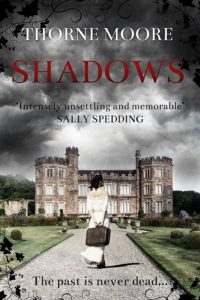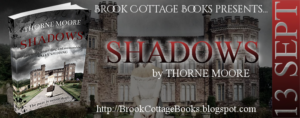
#blogblitz – Shadows by Thorne Moore @ThorneMoore @BrookCottageBks #guestpost #extract

I’m delighted to be taking part in the blog blitz for Shadows by Thorne Moore. I’m sharing a short extract with you along with a fabulous guest post about bad guys, but first here’s what it’s all about:
![]()
Genre: domestic noir. Psychological Crime. Women’s lit. Paranormal.
Release Date: 14 June 2017
Publisher: Endeavour Press
Kate Lawrence can sense the shadow of violent death, past and present. In her struggle to cope with her unwelcome gift, she has frozen people out of her life. Her marriage is on the rocks, her career is in chaos and she urgently needs to get a grip.
So she decides to start again, by joining her effervescent cousin Sylvia and partner Michael in their mission to restore and revitalise Llys y Garn, an old mansion in the wilds of North Pembrokeshire.
It is certainly a new start, as she takes on Sylvia’s grandiose schemes, but it brings Kate to a place that is thick with the shadows of past deaths. The house and grounds are full of mysteries that only she can sense, but she is determined to face them down – so determined that she fails to notice that ancient energies are not the only shadows threatening the seemingly idyllic world of Llys y Garn.
The happy equilibrium is disrupted by the arrival of Sylvia’s sadistic and manipulative son, Christian – but just how dangerous is he?
Then, once more, Kate senses that a violent death has occurred…
Set in the majestic and magical Welsh countryside, Shadows is a haunting exploration of the dark side of people and landscape.
![]()
‘Is it haunted, Kate?’ Sylvia clapped her hands, like a child wanting ice-cream. ‘Oh please, please say there’s a ghost down here.’
‘There’s a ghost down here.’
‘No seriously, please tell me. You’d sense one, I know.’
What the hell. I closed my eyes solemnly. ‘I detect – a definite shiver of fear.’
‘Is that all? I was hoping for a white lady. If only we had battlements. I’m sure we’d have had a white lady, walking in the moonlight.’
‘Perhaps we can persuade one to move in.’
‘Yes!’ Sylvia gripped my arm. ‘A ghost hotel! We could get a licence to serve spirits!’
We were still laughing as we climbed back to the buttery. To finish, she led me on into the second small room, under the upper chamber.
As before, a low square room. One tiny window, two doors, stained walls, stone floor, just another empty room. ‘Not sure what to call this one,’ babbled my cousin. ‘Think of a good name. The armoury! I wonder if we could get a suit of armour.’ She was already opening the far door, into a panelled arch through deep masonry back into the Great Hall.
Just a doorway to Sylvia.
But not to me. Oh God, not to me.
‘Come on,’ she sang. ‘Where next?’
I watched her pass through, amazed that she could sense nothing. Rigid in my determination to conquer, I followed her, trying to block out the shadow, to refuse it entry into my brain.
I couldn’t. It overwhelmed my defences, enveloping me in a black cloud. Huge atavistic fear, searing thirst, gut-wrenching despair. I could feel the interweaving strands of emotion like filaments of rot, tightening around me, meshing in my lungs, my veins, my bones. How could Sylvia possibly not feel this?
If you like the sound of Shadows then you can buy it from AMAZON UK and AMAZON US.
Now over to Thorne for her guest post about bad guys.
![]()
You can’t have drama without a clash – someone or something to fight against. Story-telling has always relied on a battle between heroes and villains, from King Arthur and Mordred to Smiley and Karla. It’s relatively easy to come up with your goodie and your baddie, but unless you’re drawing a cartoon, you really don’t want your characters to be two-dimensional – white hat versus black hat.

Fanny Price
Perhaps the most interesting conflicts driving dramatic tension are those between disparate aspects of one character’s personality, because then the character becomes real. A hero (or heroine) who can do no wrong, has no weaknesses or doubts and never makes mistakes, is not only unbelievable but hopelessly boring. Jane Austen claimed that in writing Emma, she was creating a heroine that no one would like except herself, presumably because Emma has faults. But it isn’t Emma Woodhouse, with all her failings, who drives readers mad, but the perfectly virtuous Fanny Price in Mansfield Park.

Ross Poldark
Protagonists have to have some failings to be believable, but it’s a question of deciding what failings to add, before the character becomes too unattractive. Doubt is fine. In fact, it’s excellent. It is at the heart of humanity. Anyone who has no doubts is a dangerous fanatical beast. But could your protagonist have less acceptable failings. Could he be angry? Sullen? Selfish? Or violent? A rapist? I’d say no, but then Ross Poldark seems to get away with it.

Satan

Rickman’s Sheriff of Nottingham
Villains are so much easier to create as rounded characters because, unless they are psychopaths in masks, haunting dark alleys and armed with a chainsaw, or megalomaniacs with a penchant for white Persian cats, they are never totally and irredeemably evil. They are bound to have some virtues, or at least some purely human frailties. Often, of course, they have too many of the most likeable virtues. Like charm, humour, even nobility. Then you run the risk of the reader preferring the villain to the hero. Did Milton, in his mission to justify God’s work to Man, in Paradise Lost, really intend to have his readers rooting for Satan, rather than God? If you want to portray a virtuous heroic, sexy Robin Hood, don’t pit him against a Sheriff of Nottingham played by Alan Rickman. Against poor angelic Fanny Price and oh so virtuous Edmund Bertram, Jane Austen placed Mary and Henry Crawford, who are so utterly charming and witty that it’s very easy to overlook the fact that they are actually quite despicable.
For my part, I prefer to create villains without the saving grace of charm, but without being outright psychopaths. All right, in The Unravelling, I went totally against the grain, but in my latest book, Shadows, I revert to my highly principled stand that villains, however monstrously they behave, are, deep down, just weak and pathetic failures. Lost souls. That, perhaps, allows the reader to find some iota of sympathy for them, because, deep down in all of us, we have the potential to be weak and pathetic, and we know it.
Thank you, Thorne. What a fascinating look at the bad guy.
![]()
 Thorne was born in Luton and graduated from Aberystwyth University (history) and from the Open University (Law). She set up a restaurant with her sister but now spends her time writing and making miniature furniture for collectors. She lives in Pembrokeshire, which forms a background for much of her writing, as does Luton. She writes psychological mysteries, or “domestic noir,” and her first novel, A Time For Silence, was published by Honno in 2012. Her second Motherlove, was published in 2015 and her third, The Unravelling, came out in 2016. A collection of short stories, Moments of Consequence, came out the same year. She’s a member of the Crime Writers Association.
Thorne was born in Luton and graduated from Aberystwyth University (history) and from the Open University (Law). She set up a restaurant with her sister but now spends her time writing and making miniature furniture for collectors. She lives in Pembrokeshire, which forms a background for much of her writing, as does Luton. She writes psychological mysteries, or “domestic noir,” and her first novel, A Time For Silence, was published by Honno in 2012. Her second Motherlove, was published in 2015 and her third, The Unravelling, came out in 2016. A collection of short stories, Moments of Consequence, came out the same year. She’s a member of the Crime Writers Association.
Discover more from Short Book and Scribes
Subscribe to get the latest posts sent to your email.

Thank you so much for this
You’re welcome, Thorne. And thank you for the great post.
Fantastic guest post. I loved The Unravelling and really must make time to read Shadows. It sounds great and that cover! I can’t resist a spooky, gothic house.
Thank you, Abbie. Shadows does look like a fantastic read.
Great read, thanks! Very insightful information about creating believable characters, it’s great to have a look at an author’s creative process like this!
Glad you enjoyed it, Alison.